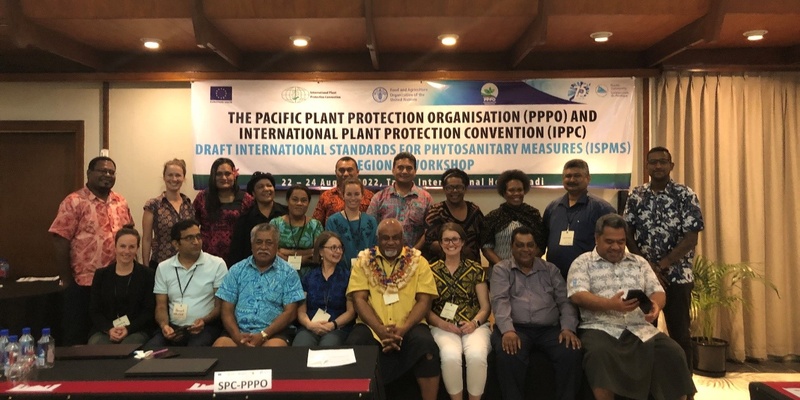IPPC Regional Workshop successfully held in the Pacific region
Posted on Tue, 25 Oct 2022, 07:21

Nadi, 21 October 2022. The annual regional workshop for the Southwest Pacific region was held in Nadi, Fiji, where participants formulated regional comments on draft International Standards on Phytosanitary Measures (ISPMs) and discussed further updates and regional priorities on plant health and climate change.
The three-day workshop was organized by the Secretariat of the International Plant Protection Convention (IPPC), in cooperation with the FAO Sub-regional Office for the Pacific Islands (SAP), and the Pacific Plant Protection Organization (PPPO). The gathering intended to develop the capacity of national plant protection organizations (NPPOs) in the region in a range of areas related to the IPPC. It also aimed to build NPPOs’ capacities in analyzing draft ISPMs and formulating productive comments on ISPMs, and to discuss regional experiences and priorities. Nineteen participants from the region attended in person from Australia, Cook Islands, Fiji, French Polynesia, Kiribati, New Zealand, Samoa, Timor Leste, Tonga, Tuvalu and Vanuatu. Additionally, New Caledonia, the Federal States of Micronesia and the Marshall Islands joined virtually to participate in the meeting.
“The work of the IPPC is crucial to plant health regulations and standards which are widely recognized by the international community,” said IPPC Secretary Osama El-Lissy in his opening remarks. El-Lissy also highlighted the United Nations General Assembly’s adoption of 12 May as the International Day of Plant Health which continues to advance the legacy of the International Year of Plant Health.
Participants reviewed and provided comments on six draft ISPMs under consultation, including the Draft Annex to ISPM 37 Criteria for evaluation of available information for determining the host status of fruit-to-fruit flies (2018-011); the 2022 and 2021 Amendments to ISPM 5 Glossary on phytosanitary terms (1994-001); Revision of ISPM 18 Guidelines for the use of irradiation as a phytosanitary measure (2014-007); Revision of ISPM 4 Requirements for the establishment of pest-free areas (2009-002), and the Use of specific import authorizations (Annex to ISPM 20 Guidelines for a phytosanitary import regulatory system) (2008-006).
On the last day, updates on IPPC activities were shared with participants, including from the Commission on Phytosanitary Measures, the Standards Committee, and the Implementation and Capacity Development Committee. The IPPC Secretariat further shared the benefits of IPPC tools including the Phytosanitary Capacity Evaluation, the ePhyto solution, National Reporting Obligations, and the Emerging Pest Outbreak and Alert Response System. Activities of the FAO regional and subregional phytosanitary capacity development and that of the Near East Plant Protection Organization (NEPPO) were also presented.
Related information:
Fiji Times article: https://www.fijitimes.com/biosecurity-and-plant-quarantine-experts-seek-solutions-to-new-pests-and-diseases/

